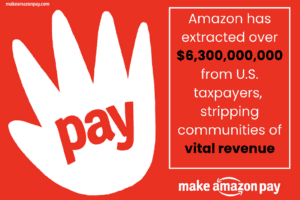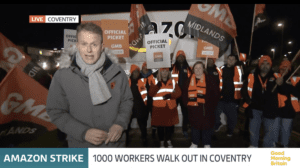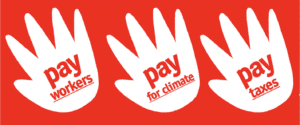 Good Jobs First joined trade unionists and campaigners from across the world for the first #MakeAmazonPay summit in Manchester last month. Across the globe, Amazon’s business model is leaving workers unsafe and under paid and carbon emissions at record levels.
Good Jobs First joined trade unionists and campaigners from across the world for the first #MakeAmazonPay summit in Manchester last month. Across the globe, Amazon’s business model is leaving workers unsafe and under paid and carbon emissions at record levels.
Meanwhile governments are awarding contracts to Amazon that continue to support the growth of this model. At the summit, Ron Knox from the Institute for Local Self-Reliance, one of our fellow members in the Athena Network, reported that Amazon had $1.9 billion in federal contracts in the U.S., and GMB research here in the UK revealed £684 million in UK government contracts.
Many of these contracts are for Amazon Web Services, highly concerning given the giant has paid out an estimated $120 million in fines and settlements for privacy violations in the last couple of years.
Meanwhile our Amazon Tracker shows that US state and local economic development subsidy deals given to Amazon.com have now exceeded $6.3 billion since 2000. The number is likely significantly higher – it has been increasingly difficult to price tag subsidy packages, including vast power discounts the company enjoys.
The profits generated by these subsidies and large government contracts allow Amazon founder Jeff Bezos to take a trip to space, whilst on the frontline over a million Amazon workers keep the company moving forward on low wages, precarious contracts and poor conditions.
Dharmendra Kumar, convenor of the Amazon India Workers Association told the summit how Amazon workers in India were working 50-hour weeks for around $100 a month, with only 3% of the workforce on permanent contracts.
Sub-contracted workers at Amazon faced even worse conditions. Attendees at the summit heard a report from Amnesty International into Nepalese migrant workers working for Amazon in Saudi Arabia. These workers were taking out loans to pay recruitment fees to sub-contractors who deceived them, took earnings and left them in appalling conditions, unable to find alternative employment or return home.
In the U.S., data from Violation Tracker shows that Amazon has been sanctioned multiple times for failures to pay workers properly. In 2021 it agreed to pay more than $61.7 million to settle charges that it failed to passed on the full amount in tips owed to Amazon Flex drivers. The same year it settled an 11 year long dispute over failures to compensate workers for time spent in mandatory security checks.
Amazon warehouse safety failures were a major issue highlighted by many speakers at the summit. Emma Greenman, member of the Minnesota House of Representatives, described Amazon warehouses as the most dangerous places to work in Minnesota. In Bangladesh, Nazma Akter, President of the Sommilito Garments Sramik Federation, has been leading a campaign to get Amazon to sign the International Accord – a legally binding agreement that companies can sign up to in the wake of the Rana Plaza collapse to ensure safe workplaces, which Amazon still refuses to sign.
Violation Tracker shows that Amazon has committed at least 102 safety-related offences in the U.S., for workplace safety violations as well as aviation safety offences in which the company was accused of shipping dangerous goods. In the UK, Amazon was fined for the same offence, shipping items such as lithium-ion batteries by air despite warnings.
In the UK Amazon appears to benefit from an enforcement gap. A 2021 report co-authored by Unchecked UK and Focus on Labour Exploitation revealed that local authority proactive health and safety inspections were down 94% from 2009 to 2020. As local authorities are responsible for enforcement of safety standards in warehouses, this explains why in Coventry, where ambulances were reportedly called to the Amazon warehouse 143 times over a three-year period, no immediate prohibition notices were issued by the Council.

Amazon’s climate footprint was no better than its safety record. Amazon Employees for Climate Justice revealed that despite Amazon’s climate pledge in 2019, its emissions had actually grown by 40%.
Amazon’s economic model is just not compatible with the changes needed to combat climate change. As Alma Dufour, member of parliament in France described, low prices mean more consumption, more consumption means more dumping; Lynn Boylan, member of the Seanad Éireann in Ireland, reported that Amazon was dumping around a billion items a year.
What is needed, Alma Dufour put forward, are environmental standards in conjunction with the imposition of minimum wages, and indeed there was much cause for hope amongst the international group brought together by UNI global union and Progressive International in Manchester. Better regulation brought in by legislation such as the Rider’s law in Spain which recognises workers even when the relationship with the employer is organised through an algorithm, and efforts to reduce delivery demands via city planning in Paris, were signs that political changes were happening.
 However, the greatest cause for hope was the international solidarity shown in coming together to discuss how to #MakeAmazonPay
However, the greatest cause for hope was the international solidarity shown in coming together to discuss how to #MakeAmazonPay
You can join the call to #MakeAmazonPay at makeamazonpay.com and follow Amazon subsidy awards on our Amazon Tracker. Track the company’s regulatory breaches at Violation Tracker and Violation Tracker UK.